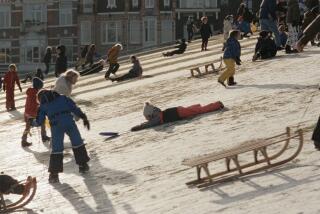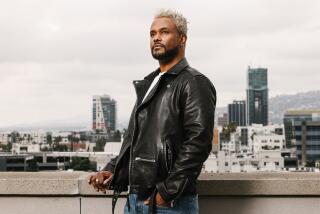Review: âMoffieâ adroitly depicts a gay manâs life in the apartheid-era South African army
The Times is committed to reviewing theatrical film releases during the COVID-19 pandemic. Because moviegoing carries risks during this time, we remind readers to follow health and safety guidelines as outlined by the Centers for Disease Control and Prevention and local health officials.
Apartheid South Africa was expert at churning out hate in its ruling white minority, and if one happened to be gay â then a literal crime â the loathing was conditioned to turn inward, too, like a self-throttling. Key to the sanctioned barbarism that defined the regime was its conscripting of young white males into their ongoing border wars, a brutalizing passage into toxic hetero-manhood depicted with pressurized sensitivity and artful dread in Oliver Hermanusâ compelling dramatic feature âMoffie,â named for the Afrikaans homophobic slur that followed anyone perceived as insufficiently masculine.
The story, adapted from a memoir-like novel by AndrĂŠ Carl van der Merwe, is set in 1981, when fair-haired, soft-featured teenager Nicholas Van der Swart (Kai Luke Brummer) is about to start two years of compulsory military service in the South African Defense Force, feeding a campaign at the northern border (what is now independent Namibia) shooting at USSR-backed Angolans. The patriotic line was about stopping communism; the reality was defense of a racist state. And from the jolting train journey to the first grim days in uniform â intensified by a square aspect ratio that acts as a vise on Nicholasâ viewpoint, and a groaning, plucked-strings score like an upset stomach â these early scenes are a charged sequence of ritualistic brutality and dehumanization, devoid of any hint of basic training as some romanticizing shaper of healthy discipline.
These are young men reinforced in violent bigotry. The more wild-eyed conscripts are already equipped enough in hate to gleefully hurl invective at a Black man waiting at a station platform; at camp, they in turn get abused into a more systematic compliance in sour machismo by snarling Sgt. Brand (a pulsating Hilton Pelser), nastily fixated on ridding his ranks of any homosexuality. (One imagines this version of a well-trod military archetype wouldnât even abide the âthis is my gunâ gesture in the Marine chant made famous in âFull Metal Jacketâ â might lead to the wrong kind of âfun.â)
The atmosphere readily breeds macho policing. For Nicholas, being gay means being hyper-aware, a survival-minded observer shrewd enough to deflect any aggressive jock talk that grows threatening. Though the parting gift of a porn mag from his caring dad initially seemed clueless, at the right moment it proves useful as a badge of straightness. But Nicholas â played with magnetic reserve by Brummer â also recognizes a kindred partner in concealment when he sees one, allowing friendly exchanges with compassionate fellow recruit Dylan Stassen (Ryan de Villiers) to become an unspoken desire and watchful caring. Thatâs all it may get to be, too, considering the punishment not only meted out in front of the recruits to those caught in homosexual acts, but also the rumors of a horrific place some are being sent to for further âtreatment.â
Hermanus, as a Black, queer South African, isnât about to paint Nicholasâ predicament as on a par with apartheidâs true victims. But the emotional intelligence he infuses âMoffieâ with â all the way through its inevitable march to the front line â feels personal nonetheless, and empathetically inquisitive about the kind of masculine indoctrination that fuels oppression through rituals of violence and the criminalizing of identity. Itâs especially resonant in the brilliantly shot flashback scenes dramatizing a memory of Nicholasâ from a swimming pool incident â one in which his dad memorably figures â and how distractive curiosity becomes the stuff of abiding, debilitating shame.
Aside from the many fine performances and the aforementioned boxed framing of Jamie Ramsayâs coolly evocative cinematography â a still-refreshing aesthetic choice that rewards attention to close-ups, bodies and landscapes â Hermanusâ use of different music styles is enriching, too, mixing Braam du Toitâs score with recordings (from classical to opera to disco) that atmospherically complement the emotional timeline. Closing the film after an enigmatic, melancholy beach scene is a haunting cover of the Rodriguez song and unexpected apartheid-era anthem âSugar Man,â like a solemn coda about who we are after weâve been taught not only to kill others, but something inside us.
'Moffie'
In Afrikaans and English with English subtitles
Not rated
Running time: 1 hour, 44 minutes
Playing: Starts April 9, Laemmle Royal, West L.A.; Laemmle Playhouse 7, Pasadena; Laemmle Noho 7, North Hollywood; also available on digital and VOD
More to Read
Only good movies
Get the Indie Focus newsletter, Mark Olsen's weekly guide to the world of cinema.
You may occasionally receive promotional content from the Los Angeles Times.









